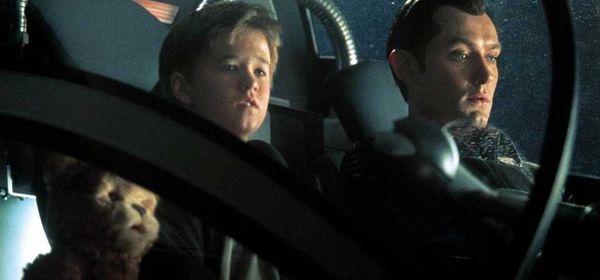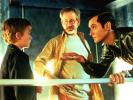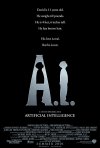Eye For Film >> Movies >> A.I. (2001) Film Review
A.I.
Reviewed by: Angus Wolfe Murray

When Steven Spielberg took over A.I. from Stanley Kubrick, he brought something of his own to the project - humanity. A film about the future, in which New York, Amsterdam and other low lying cities have been drowned, thanks to global warming, could so easily have turned into a computer-generated wasteland, serviced by robots.
Kubrick might have spent a year and a half perfecting the ultimate techno environment. Spielberg spent five months telling the story of a boy who wants to be real. The effects and gadgets are secondary to David's quest. That is Spielberg all over. Wherever there is a heartbeat, he stimulates it. Wherever there are tears, he finds them.

David (Haley Joel Osment) is a unique prototype, created by Professor Hobby (William Hurt), to advance robotic science. "We must build robots that can love," he announces. "Can you get a human to love them back?" inquires one of his students. That is the question.
David is delivered to a family, whose only son remains deep frozen, awaiting a cure. David is the replacement. His "mother" (Frances O'Connor) finds it hard at the start and is never completely relaxed about the experiment. David is so good, such little trouble. He doesn't need sleep or food, or entertaining. He needs affection.
The concept is far wider than the difference between intestines and fibre-optics. In every respect David is a boy. He looks like one, he behaves like one, he responds to bullying like one. Mummy reads Pinocchio as a bedtime story and it changes his understanding of life. When things go wrong and he finds himself abandoned in the world outside of home, he has one abiding desire, to become a real boy, and he knows, as only an artificial intelligence can, that The Blue Fairy in "the lost city in the sea at the end of the world, where the lions weep," will make it happen.
Spielberg's future world is a mixture of Aldous Huxley and Mad Max. Robots are more than servants. Being mechanical, they can be abused at will, and there are scenes straight out of Sid's room from Toy Story, where mutilated robots attempt to mend themselves, using spare parts from a rubbish dump. Joe the Gigolo (Jude Law), whom David befriends, is as wise as his knowledge allows. David, being the first and, he thinks, only child robot, has only limited experience to guide him.
Visually, the film astonishes, not only in its restraint and subtlety of light, but with its inventiveness. Spielberg is not doing a George Lucas here. Monsters and grotesques are kept for special occasions. Emotionally, the message is clear. Love is pain. Sadness clothes David's naked needs, as if happiness is a ghost.
David cannot dream. He's mechanical. He can only hope.
"Make me a real boy. Please."
Joe has seen the darkness in the image of the world. "They hate us, you know, the humans," he says. "They made us too smart, too quick, too many."
A.I. belongs to Spielberg - who wrote the script from a short story by Brian Aldiss - and to Osment, who, at 12-years-old, is the most heart-rending child actor of his generation. It is almost a triumph.
There are those who will say that to be left in pieces is proof of a director's manipulative skills. Others will think hard and deep on it. Behind the facade of sci-fi, you can hear the weeping.
Reviewed on: 20 Sep 2001

















